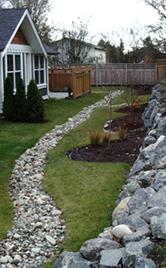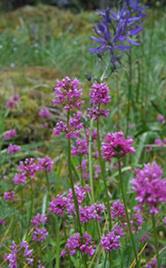Discover your Watershed
Get involved and learn about ways you can clean, protect and enhance your watershed in the capital region.
Our urban watersheds are mainly covered in impermeable surfaces (parking lots, buildings, roads, etc.) causing water to flow quickly across surfaces, picking up debris and pollution, and draining into storm drains which lead directly to waterways including our harbours and ocean. We can protect and enhance our watersheds by limiting the introduction of pollutants (oils, gas, pesticides, fertilizer, chemicals, etc.), collecting rainwater, maintaining native plant gardens plus many more ways.
Manage your Flows:
One of the most pressing issues in watersheds of the capital region is the effect of urbanization. When humans develop cities we change the landscape, pave roads and parking lots and build structures with  roofs. These impervious surfaces no longer allow rainwater to soak into the ground as it would in the natural environment. Rain water flows quickly off these hard surfaces and into our storm drain system, which head straight to our creeks, rivers and streams.
roofs. These impervious surfaces no longer allow rainwater to soak into the ground as it would in the natural environment. Rain water flows quickly off these hard surfaces and into our storm drain system, which head straight to our creeks, rivers and streams.
The effect on the stream is similar to that of turning a firehose on your garden for short periods of time! This effect is intensifying in recent years due to the changes in our climate. The result on our creeks, rivers and streams devastates fish spawning beds and habitat for our aquatic plants and animals. The water quality also suffers due to the harmful effects of increased turbidity, which destabilizes water temperatures and reduces oxygen for plants and animals.
Property owners can take action by managing their rainwater and reducing their flow off site:
Further Action:
- Retain native trees, shrubs and grasses when developing
- Plant a native plant garden to absorb flows
- consider a hedgerow instead of a fence
Preventing Pollution
 Many of our local streams, lakes and wetlands are polluted and unsuitable for plant and animal life. These problems arise from run off and human activities such as pesticides and fertilizers, paint chips and roof and tire material, and soaps from power washing, and oils and gasolines from spills and roadways.
Many of our local streams, lakes and wetlands are polluted and unsuitable for plant and animal life. These problems arise from run off and human activities such as pesticides and fertilizers, paint chips and roof and tire material, and soaps from power washing, and oils and gasolines from spills and roadways.
A growing concern in our region is home heating oil spills. Home heating oil tanks can fail, leading to oil spills into our creeks and streams causing potential health risks or environmental damage that is costly to clean up. As well, septic and sewer leaks contribute to bacterial pollution. Learn about inspecting, maintaining and repairing your sewer and septic pipes to prevent or repair leaks.
Take Action:
Restoration & Community Clean-Ups
Many groups exist in our region to restore and clean up our watersheds. Get involved in one of these groups and help make a difference in our region. Volunteers are always needed!
 CRD coordinated initiatives:
CRD coordinated initiatives:
Community initiatives:
These are just a few - look for a "friends of" group in your neighbourhood!